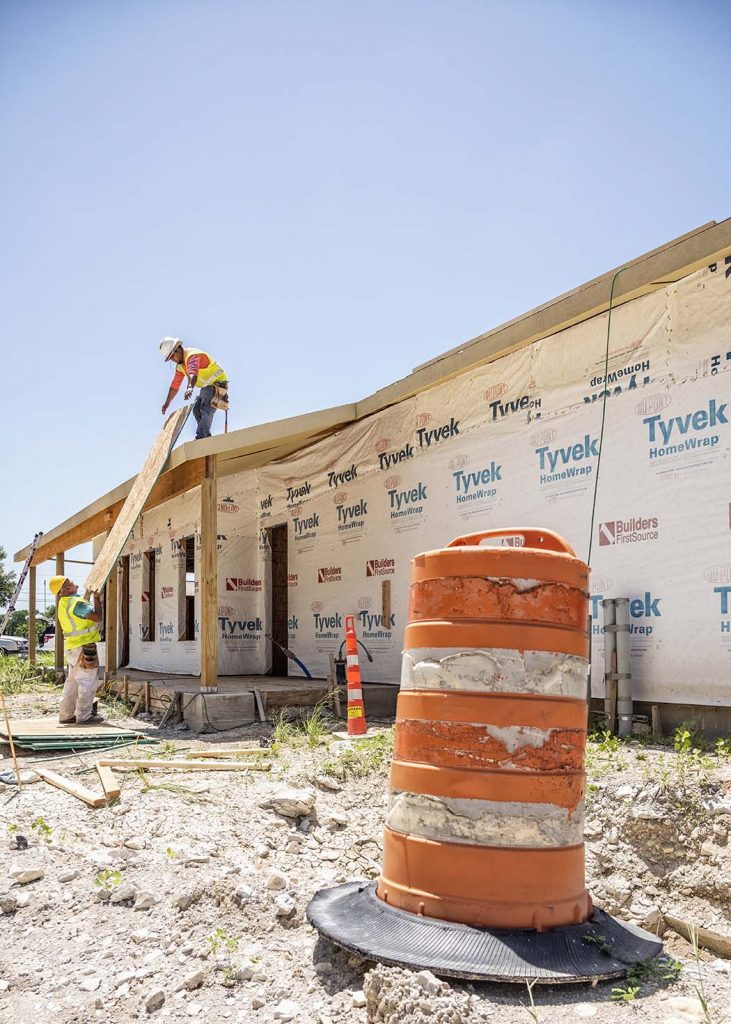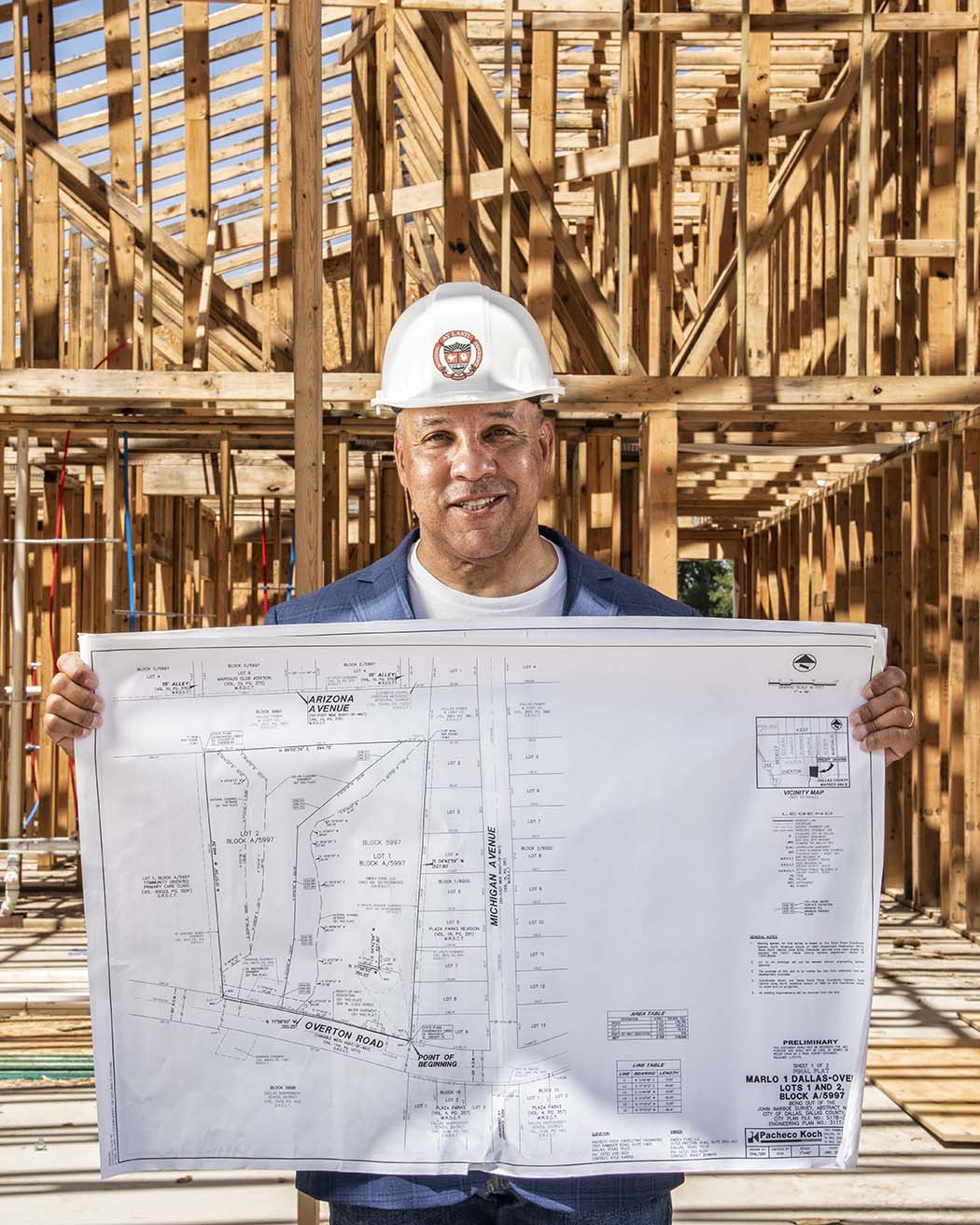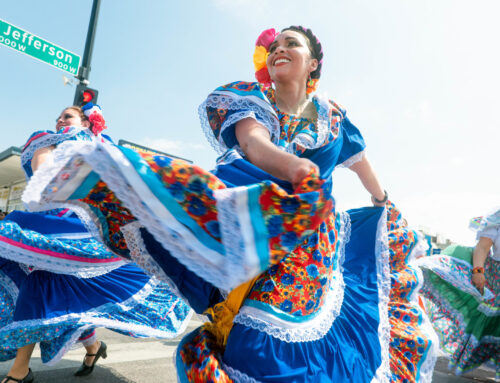Businessman Randy Bowman grew up in Pleasant Grove and is a Dallas ISD graduate. His nonprofit, At Last, is building a residential campus for elementary students in Oak Cliff. Photography by Danny Fulgencio
The first “boarding experience” for Dallas ISD students whose homes lack the stability needed to reach higher achievements is expected to open in Oak Cliff this fall.
At Last! is under construction at 405 E. Overton Road, near South Oak Cliff High School, but it’s not a school. It’s intended to be a home away from home where boarders live Monday-Friday. They can attend any school, but an enrollment lottery will give preference to students who live in the neighborhood surrounding the dormitories.
The first 16 students, who could move in as early as next year, will be elementary age, and they could stay with the program through middle school. The plan is to eventually build three houses sleeping 16 boarders each.
“We are not curricular. We don’t seek to replicate what teachers and principals do,” says Randy Bowman, a DISD graduate and businessman who is the CEO of At Last! “We are more replicating what parents do when they come home from work and give their kids a snack and ask them how their day went and what homework they have.”
How At Last! works:
The 16 scholars-in-residence will live at the house from about 3 p.m. Sunday until they leave for school Friday morning. Each house will have a dining area and great room similar to that of a middle-class home, with family-style meals at a dinner table, quiet places to study and tutoring as needed. There will be four bedroom suites, each with a bathroom, that sleep four students. “Some kids don’t have the luxury of space, a quiet place to go and get your work done,” Bowman says. “It’s going to look like a well-resourced home where you can crawl onto a chair and do your work.” While kids are at school, their parents are invited to come and help tidy up the house and visit with the house parent. About 12 people are expected to be employed there during the first year.
Adults in the house:
The house parent will live in an apartment within the residence and will be a counselor who does everything that parents do in that 3-8 p.m. window. The house parent leads the “culture” of the house, setting a tone for relationships and behavior, Bowman says. “It’s an incredibly important hire for us,” he says. The house parent helps students de-stress from the day, makes sure they have their snacks and takes them through a wellness assessment. They ask, “What do you need to get done?” and figure out how the evening should unfold to get everyone ready for the next day. After homework is done, students have free time when they can socialize or call their parents and then go to bed at about 9 p.m.
Grandparent wake-up:
Bowman says the nonprofit plans to hire older adults who live in the neighborhood to arrive at 6 a.m. every morning to wake up the students and get them ready for the school day. “These would be fixed-income people who could work roughly 10 hours a week,” Bowman says. “We need you to wake these kids up in a way that leaves them feeling good about themselves and the day ahead. To leave them feeling like they’ve just gotten a warm embrace and can feel like proficient learners.”
Extracurricular:
The house parents will encourage students and make sure they have the resources to pursue their personal interests — from music, to language to coding.
How the first house is different:
The 5,700-square-foot building currently under construction will cost about $1.54 million and could be completed as early as mid-October. It will also house the nonprofit’s office and conference room, as well as a nurse’s office, an industrial laundry room and a kitchen that will provide meals for all three residences. The cost also includes an expensive driveway and fire lane that won’t have to be replicated for the other houses.
Concerns about child abuse:
“We’re going to overinvest in child safety and security of the house,” Bowman says.
In constructing the house, they’re adding surveillance cameras in all areas that are appropriate. Adults will not be allowed to be alone with children where there could be opportunities for abuse, he says. The nonprofit will run deep background checks that are more invasive than what licensing requires. They will also hire an outside agency to review internal processes. “Ongoing external eyes [are] making sure we do everything we can to prevent that,” he says. “And we would have an absolute zero-tolerance attitude for anything questionable.

What it costs:
The nonprofit’s 2020 operating budget was about $450,000. Bowman expects the annual operating budget for the first house to be approximately $890,000 each calendar year afterwards.
How it’s funded:
The Hoblitzelle Foundation was the nonprofit’s first major donor with $100,000. They also received $75,000 from the Hillcrest Foundation. The Bowman Family Trust has donated, as well as the Communities Foundation of Texas, the Village Giving Circle at the Dallas Women’s Foundation and the Simmons Sisters Fund. The Dallas City Council approved a $400,000 conditional reimbursement grant for the nonprofit, but Bowman says they haven’t received it yet. “We haven’t received a penny of public money at this point,” Bowman says. “Although we are grateful for the conditional grant.” Last year, the nonprofit organized a dominoes tournament at Red Bird Mall. The radio station KTCK got involved, and they raised $60,000. They’re planning to make it an annual event, with the next one planned for Labor Day weekend. Bowman thinks it has the potential to raise as much as $250,000.
Why this land:
The 4-acre property is in ZIP code 75216, which contributes the highest number of people to the Texas prison system. The second-highest contributor is 75217, the Pleasant Grove ZIP where Bowman grew up. “We are trying to take this into the most challenged areas that we can,” he says. “We want to make sure that it’s a place that we can enhance the quality of life.” The Trust for Public Land is building a park on the site. “It was the perfect neighborhood to go in and do this because we can impact the quality of life in that neighborhood,” Bowman says.






